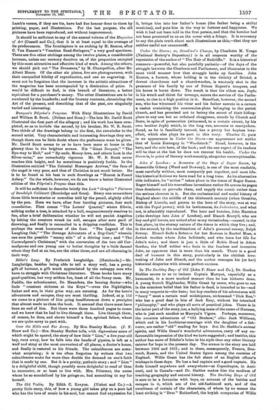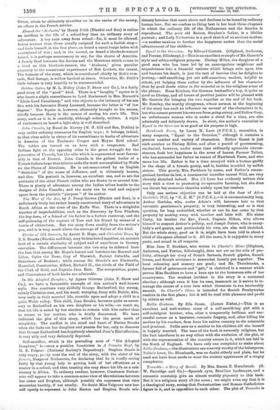In The Dashing Days of Old (John F. Shaw and
Co.), Dr. Gordon Stables seems to us to imitate Captain Marryat, especially as a humourist, in a more marked manner than he has hitherto done. A young Scotch Highlander, Willie Grant by name, who goes to sea in the mistaken belief that his father is dead, is intended to be—and in many respects is—the hero; but boy-readers of his adventures will " fancy " most a certain mad midshipman, nicknamed "Dick Rae,, who has a good deal in him of Jack Easy, without his inherited "philosophy," and who plays all sorts of practical jokes. There is in the latter part of the story, too, a bullying mate of the name of Harness, who is just such another as Marryat's Vigors. Perhaps, moreover, the amorous adventures of "Old Benbow," alias Jack Williams, which and in his Lochinvar-marriage with the daughter of a &h- carer, are rather "old" reading for boys. But Dr. Stablea's animal spirits, and Willie Grant's wonderful adventures, carry off any un- favourable impression of the kind we have suggested ; and besides, this author has more of Dibdin's brine in his style than any other literary caterer for boys in the present day. The scenes in the story are laid between 1806 and 1815; and in them, consequently, France, Den- mark, Russia, and the United States figure among the enemies of England. Willie Grant has the fall share of an English officer's mishaps in these days. He has a bad captain and a good captain. He finds himself anywhere and everywhere—at Copenhagen, in Anti- costi, and in Canada—and Dr. Stables makes him the medium of teaching geography and natural history. The Dashing Days of Old is sure to be a favourite with boys, on account of the battles and escapes in it, which are of the old-fashioned sort, and of the excellence of certain of the characters, of whom by no means the least striking is "Dem " Rutherford, the boyish companion of Willie
Grant, whom he ultimately stumbles on in the ranks of the enemy, an officer in the French service.
























































 Previous page
Previous page